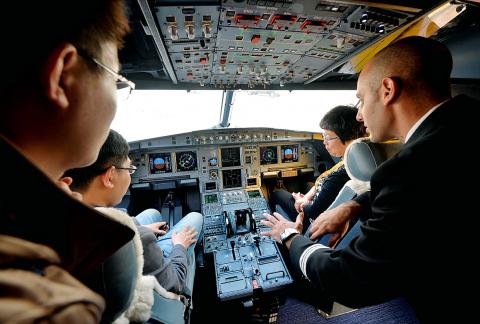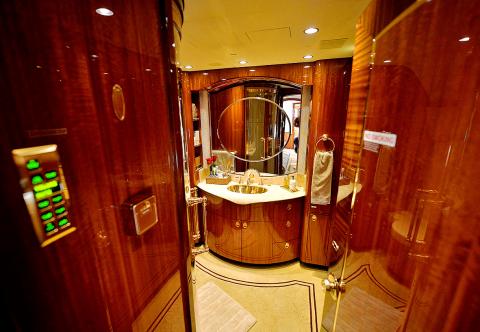When a Chinese customer asked for the interior of his new Bombardier Challenger 850 jet to be covered with pricey black carbon fiber, the designer was shocked — but happy to oblige.
“We’ll do whatever you want, as long as it’s within the realm of certification,” said Sean Gillespie, executive vice president for sales of Flying Colors, a North American aviation services firm.
“But carbon fiber, we’ve used it before, but usually it’s used as a trim,” he said.

Photo: AFP
The market for private jets — sometimes called business or executive jets — is a small but fast growing aviation segment in China, where rapid economic development has created a surge of new wealth.
The first US Gulfstreams only arrived in the country in 2003, but a decade later there were 248 business jets in China, a 28 percent leap from 2012’s figure, consultancy Asian Sky Group said.
Customers include Jack Ma (馬雲) of e-commerce giant Alibaba (阿里巴巴), in the process of a multibillion-dollar share offer in the US, and Wang Jianlin (王健林) of Dalian Wanda Group (萬達集團), which bought the US cinema chain AMC.

Photo: AFP
“Buyers can be in their 20s, in their 70s. They can be in real estate, investment, oil and gas. They are from all over China,” said Jason Liao, head of consultancy China Business Aviation Group.
“There is no typical Chinese buyer,” he said.
One thing they have in common: tens of millions of US dollars available to buy their own planes. European firm Airbus has just started offering an US$80 million budget version of its corporate jet in China, with a pre-designed cabin instead of a fully-customized one.
They can be swayed by the little details. So Gulfstream has a place for a rice cooker on board, Brazil’s Embraer can sync an iPad to adjust lights and climate control, and Airbus offers a round table for playing mahjong.
Chinese billionaires’ most common destinations are nearby Asian cities such as Hong Kong, Macau and Singapore for gambling and entertainment, but they nonetheless prefer “long range, big cabin” aircraft with the ability to cross the Pacific and bring North America within reach, Airbus and Ledbury Research said in a report.
Even so, manufacturers are quick to promote planes as a business tool, rather than a toy of the rich.
There are some dark clouds on the horizon for the market: more moderate economic growth and limits on flight paths since most of China’s airspace is controlled by the military, along with a lack of infrastructure for private planes.
China has just 286 landing sites suitable for these types of aircraft, state media say.
“There are some challenges with airspace, with airport take-off and landing restrictions,” said Scott Neal, senior vice president for sales and marketing at Gulfstream.
At the moment, potential buyers are also eager to keep a low profile amid an ongoing government austerity campaign and anti-corruption drive launched after Chinese President Xi Jinping (習近平) took over as head of the Chinese Communist Party at the end of 2012.
“If you back up two years ago, this market was really happening very fast and was kind of electric,” Boeing Business Jets president Stephen Taylor said.
“It definitely has been less aggressive and a more subdued market ever since the new administration came in and started pushing against some of the luxury items,” he said.
Asian Sky’s general manager Jeffrey Lowe added: “Maybe not getting into the biggest and flashiest airplane is certainly the best approach these days.”
However, he said, “other than that, they still have a definite need for the aircraft and most of them are finding ways to buy.”
At a recent air show in Shanghai a middle-aged man sat near a Gulfstream display, but declined to give his name and attributed his presence to his tall companion, introducing her as a fashion designer.
“I only came along because my girlfriend wanted to look at planes,” he said.

TRADE WAR: Tariffs should also apply to any goods that pass through the new Beijing-funded port in Chancay, Peru, an adviser to US president-elect Donald Trump said A veteran adviser to US president-elect Donald Trump is proposing that the 60 percent tariffs that Trump vowed to impose on Chinese goods also apply to goods from any country that pass through a new port that Beijing has built in Peru. The duties should apply to goods from China or countries in South America that pass through the new deep-water port Chancay, a town 60km north of Lima, said Mauricio Claver-Carone, an adviser to the Trump transition team who served as senior director for the western hemisphere on the White House National Security Council in his first administration. “Any product going

High above the sparkling surface of the Athens coastline, the cranes for building the 50-floor luxury tower centerpiece of Greece’s future “smart city” look out over the Saronic Gulf. At their feet, construction machinery stirs up dust. Its backers say the 8 billion euro (US$8.43 billion) project financed by private funds is a symbol of Greece’s renaissance after the years of financial stagnation that saw investors flee the country. However, critics see it more as a future “ghetto for the rich.” It is hard to imagine that 10km from the Acropolis, a new city “three times the size of Monaco”

STRUGGLING BUSINESS: South Korea’s biggest company and semiconductor manufacturer’s buyback fuels concerns that it could be missing out on the AI boom Samsung Electronics Co plans to buy back about 10 trillion won (US$7.2 billion) of its own stock over the next year, putting in motion one of the larger shareholder return programs in its history. South Korea’s biggest company would repurchase the stock in stages over the coming 12 months, it said in a regulatory filing on Friday. As a first step, it would buy back about 3 trillion won of paper starting today up until February next year, all of which it would cancel. The board would deliberate on how best to effect the remaining 7 trillion won of buybacks. The move

In a red box factory that stands out among the drab hills of the West Bank, Chat Cola’s employees race to quench Palestinians’ thirst for local products since the Gaza war erupted last year. With packaging reminiscent of Coca-Cola’s iconic red and white aluminum cans, Chat Cola has tapped into Palestinians’ desire to shun brands perceived as too supportive of Israel. “The demand for [Chat Cola] increased since the war began because of the boycott,” owner Fahed Arar said at the factory in the occupied West Bank town of Salfit. Julien, a restaurateur in the city of Ramallah further south,